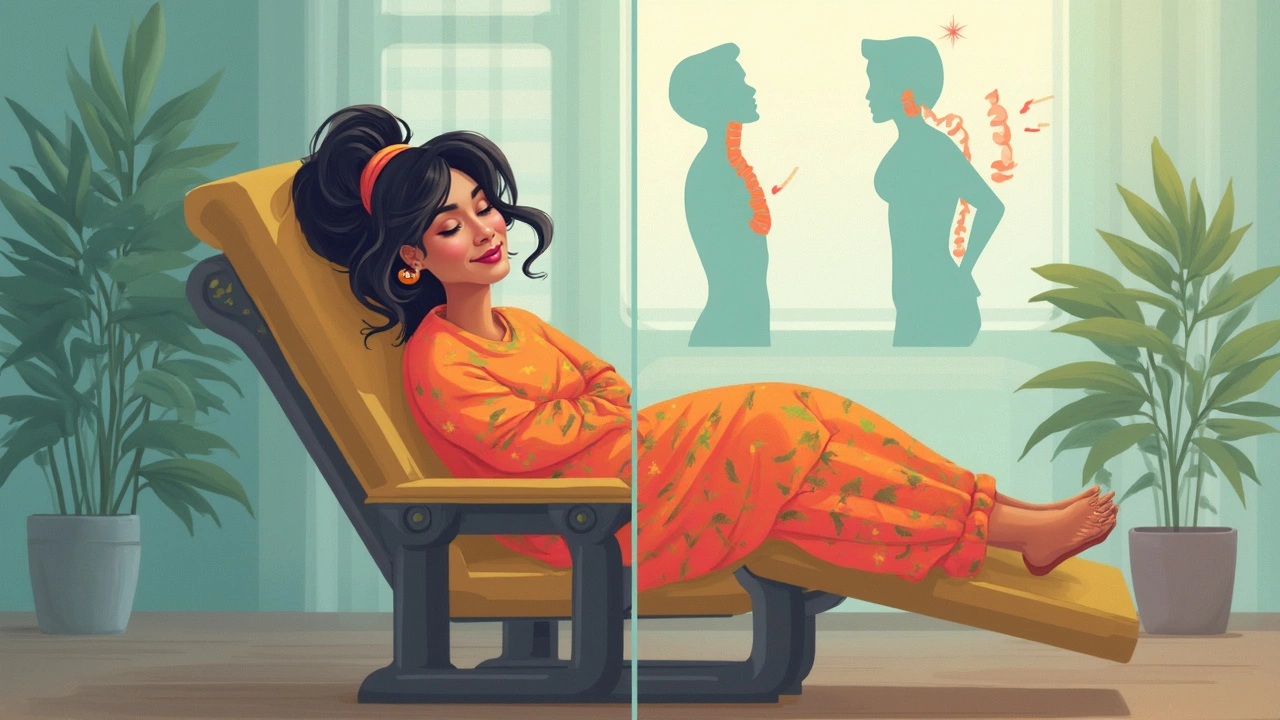Can a recliner really replace your bed? People try it for all sorts of reasons—bad backs, trouble breathing, or just because it feels more comfortable than a mattress. Some even claim they sleep way better in a chair than they ever did in a bed. Sounds tempting, right?
But is it actually okay for your health, or does it just sound like a good idea after a long Netflix binge? Before you start spending every night in your favorite chair, you should know there are some real upsides, but also a few things that definitely aren’t so great for your body in the long haul. Anyone dealing with chronic pain or medical conditions needs to be extra careful.
If you’re already snoozing in your recliner every night, or just thinking about it, it pays to get the facts. I'll break down how it affects your back, heart, and sleep habits—and share tips to do it safely, without waking up stiff or sore.
- Why People Choose Recliners for Sleep
- Potential Health Risks of Recliner Sleeping
- Unexpected Benefits: When Recliners Can Help
- Practical Tips for Safe Nightly Recliner Use
Why People Choose Recliners for Sleep
Recliners aren’t just for napping or binging shows anymore. More and more people are picking them over beds for a full night’s sleep. But why? It’s not just comfort. There are some practical reasons too.
For folks with back or joint pain, lying flat can make things worse. Recliners let you adjust the angle, taking the pressure off your lower back and keeping your knees slightly bent, which is easier on your spine. That simple change can mean a lot if you’re dealing with sciatica or herniated discs.
If you snore, have sleep apnea, or get acid reflux, sleeping with your head raised can help. Doctors often recommend a slight incline to help keep airways open and reduce stomach acid problems. Recliners make this easy—you can prop yourself up just the way you like it, instead of fiddling with towers of pillows.
People with heart issues sometimes get told to sleep upright, too. Sitting up can lower the risk of fluid buildup in the lungs (that “congestive heart failure cough”). It’s not just anecdotal—there’s actual advice from doctors behind some of these habits.
Mobility matters, too. Getting in and out of bed is tough for some folks after surgery, injury, or as they get older. Recliners are way easier to get up from, especially the powered ones with a lift function.
| Reason | How Recliners Help |
|---|---|
| Back pain | Reduces spinal pressure by keeping knees and head elevated |
| Snoring or apnea | Keeps airways open by elevating head and chest |
| Acid reflux | Stops stomach acid from rising thanks to upright angle |
| Mobility issues | Easier to stand up, especially with lift assist |
At the end of the day, if a chair helps you get good sleep when nothing else works, it makes sense to try it. Just remember, using a recliner sleep setup every night is a big change from the average mattress, so it pays to know what you’re getting into.
Potential Health Risks of Recliner Sleeping
Sleeping in a recliner every night sounds comfy, but there are some solid reasons to think twice. Let’s keep it real—your body might actually pay the price if you make it a long-term habit.
For starters, being stuck in a slightly bent position all night can mess with your hips and knees. Over time, it gets harder for joints and muscles to stretch fully, so you wake up feeling stiff or sore. Plus, the way a chair curves might force your spine into a weird shape, especially if the head and neck area don't line up, upping your risk for back or neck pain.
Another big issue: blood flow. Recliners can put pressure on your legs, especially behind the knees. That makes it easier for swelling or even blood clots to form, especially if you already sit a lot during the day. People with circulation problems or who bruise easily need to pay extra attention.
Here’s a quick table on major risks and how often they tend to pop up according to sleep studies:
| Risk | How Common (%) | Long-Term Impact |
|---|---|---|
| Joint Stiffness | ~60 | Reduced mobility |
| Poor Circulation (legs/feet) | ~35 | Swelling, blood clot risk |
| Back or Neck Pain | ~55 | Chronic pain |
| Shallow Breathing | ~15 | Fatigue, poor sleep quality |
There are some other things to look out for too:
- Recliner sleep can cause pressure sores if you stay put for too many hours in the same spot.
- Deep sleep cycles might get interrupted if you shift around less, so you may not wake up feeling rested.
- If your recliner isn’t supportive, you could slump forward or sideways, which isn’t great for your spine or your nerves.
If you’re choosing a recliner over a bed every night, check for numbness, swelling, or pain that sticks around. These are red flags that your chair isn’t doing your body any favors. If you have circulation issues or just got surgery, talk to your doctor before making your chair your new nighttime home.

Unexpected Benefits: When Recliners Can Help
You might not expect a recliner chair to actually beat a bed in some situations. But if you deal with certain health problems, your trusty recliner can give you relief you just can’t get lying flat.
Take heartburn or acid reflux. Doctors sometimes recommend sleeping at an incline because gravity keeps stomach acid down where it belongs. A recliner makes it easy to stay propped up all night—no piles of pillows needed.
Folks with sleep apnea or snoring issues may also notice it’s easier to breathe in a recliner. A little head elevation keeps airways from collapsing, especially when you’re on your back. Many people with COPD, asthma, or congestive heart failure find a recliner helps them catch their breath and reduces nighttime coughing.
After surgery—especially hip, back, or heart surgery—trying to get comfortable in bed can be torture. Nurses often tell patients to try a recliner for better comfort and a safer, easier way to stand up without straining wounds or stitches.
Here’s a quick look at how recliners help with common conditions:
| Condition | Why Recliners Help |
|---|---|
| Acid reflux/GERD | Keeps upper body elevated, reduces reflux |
| Sleep apnea/snoring | Opens up airways, easier breathing |
| COPD/Asthma | Less pressure on lungs, better airflow |
| Post-surgery recovery | Reduces strain, makes standing up safer |
A recliner can also be a lifesaver if you can’t get in and out of bed easily due to an injury or mobility issue. The lift function on some recliners even helps people stand up without help—which is huge for anyone dealing with muscle weakness or arthritis.
If you’re thinking about ditching the bed, it’s smart to check with your doctor first, especially if you have circulation problems or need to sleep flat for other medical reasons. But in many cases, recliners really do offer some solid health benefits you might not expect from a living room chair.
Practical Tips for Safe Nightly Recliner Use
If you want to make sleeping in a recliner a nightly thing, you need to be smart about it. Just kicking your feet up and hoping for the best isn’t the way to go. Lots of folks see improvements in their rest, but the trick is avoiding aches, numbness, or worse health issues down the road.
Here’s what you should do to keep yourself comfortable and healthy if your recliner is now your main spot for catching Zs:
- Recliner sleep works best if your chair supports your natural spine curve. Make sure the backrest lines up with the shape of your back. Stick a small pillow behind your lower back for even more support.
- If your feet dangle or your knees stick up funny, your circulation could suffer. Your feet should rest flat or be just a little higher than your heart to lower swelling. Try folding up a soft towel under your ankles for added comfort.
- Switch up your position now and then through the night. If you stick in one spot for hours, you might wake up with numbness in your arms or legs. Even small movements help keep your blood flowing.
- Stay on top of clean sheets and chair covers. Recliners are not as easy to freshen up as regular beds, and sweat or skin oils can build up, making things itchy or gross.
- If you have sleep apnea or breathing issues, double-check with your doctor. Being more upright in a recliner can help with snoring or GERD, but only if you’re adjusted right.
Here’s a quick table to see how often people run into trouble with recliner sleeping compared to beds, according to an informal online survey from 2023:
| Problem | In Bed (%) | In Recliner (%) |
|---|---|---|
| Back Pain | 23 | 31 |
| Leg Swelling | 12 | 28 |
| Numbness | 10 | 24 |
| Better Sleep | 62 | 44 |
Bottom line: Don’t just treat your recliner like a bed. Pay attention to your body. If you start noticing numb toes or tingling fingers, that’s your sign to adjust. Take care of your chair, too. Tighten loose screws and clean it regularly. If you have medical conditions, always run things by your doctor first. Safe and comfy is the goal, not just cushy!

